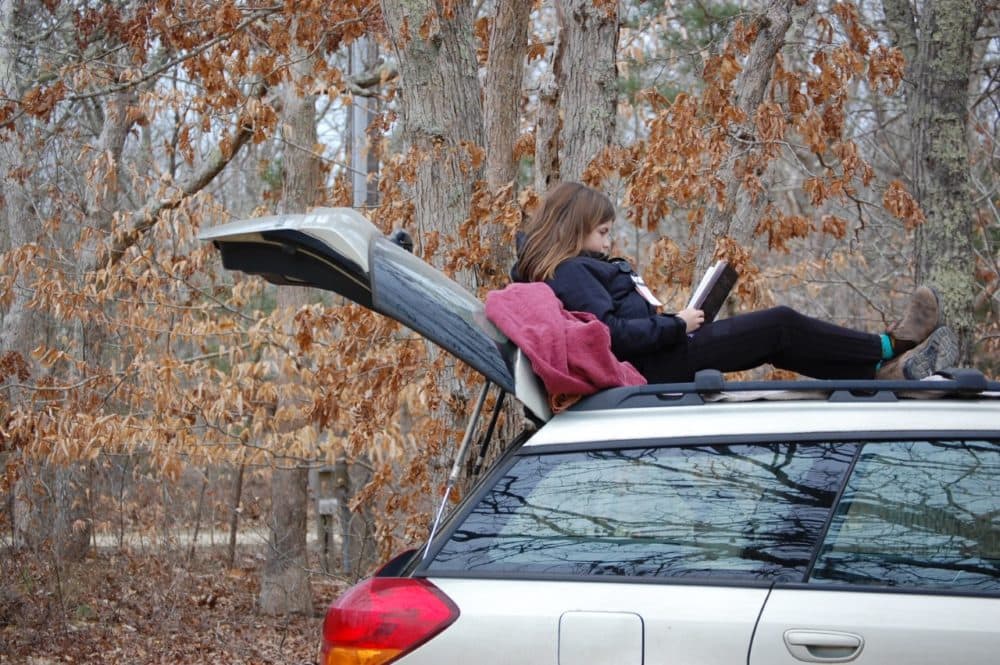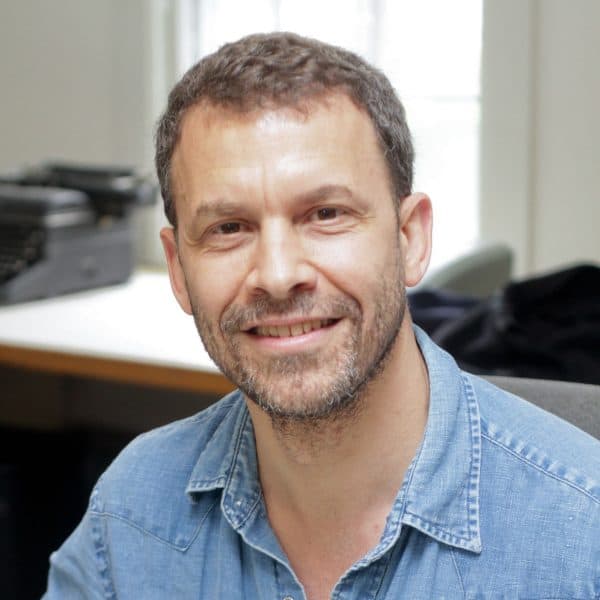Advertisement
Commentary
What The Pandemic Lays Bare: Life's Twins Of Hope And Sorrow

As I say goodnight to my 12-year-old daughter Pickle, I ask her if she would like to walk, bike or drive to school the next day.
“But I don’t go to school anymore,” she answers.
“Today, at first-period home-school, you were a bit groggy,” I respond. “Let’s mix it up. Get some air first.”
The next morning, we bike the one-mile loop around our neighborhood with full backpacks, and settle into a science lesson at the kitchen table. Pickle is doing a project on storms and has chosen tornadoes. She finds a video on the internet by some weather-chaser named Pecos Hank, showing in gruesome detail his top 10 tornadoes. It is both frightening and poetic.
The dog barks, which is odd since no one comes to the door anymore. I go to the window and see a neighbor walking a goat.
Back in the classroom, I fire off a quick text to my boss, some work stuff and a bit of banter with her about not having enough caffeine that morning. Then I return to my daughter.
Later, when I look back at the text, I am horrified. I spelled "caffeine" wrong and auto-correct inexplicably changed the word to "Vagina Ted."
The dog barks, which is odd since no one comes to the door anymore.
I quickly apologize to my boss, adding that I definitely don’t know anyone by that name. No worries, she says, and thanks me for the laugh.
My son Hardy is 15, a sophomore in high school. He has a calendar on his wall and marks off the days like a prisoner looking ahead to when his sentence will be commuted. But he also seems to be taking quite well to quarantine, watching movies, checking in with friends and doing his homework, all from the comfort of his bed. I enter his room and push him from side to side in his bed, joking that I am a nurse making sure he doesn’t get bedsores, but I am not really joking.
On Sunday morning, my wife, Cathlin, the minister of the First Congregational Church of West Tisbury, holds a virtual service for her congregation from the corner of our bedroom. She has hung thick curtains on the window and a tapestry on the wall behind her. She lights a candle to begin the service while I watch via Zoom from downstairs on the computer.
In gallery mode, I see the other congregants, including my mother and father. Cathlin leads everyone in a welcoming prayer, another person reads scripture, the musical director plays the piano from his living room, a member of the choir sings a solo.
In many ways, it feels like church, only instead of sitting shoulder-to-shoulder in a pew, staring at the backs of each others' heads as we all face forward to look at Cathlin, we now look at each other’s faces.
This makes perfect sense to me now as each hour of the day leads to a new emotion, from humor to pragmatic resolve to fear to sadness.
Cathlin relates a passage by Hildegard of Bingen, a 12th-century Benedictine nun, mystic and composer. Hildegard said that in order to have balance, we should fly with two wings of awareness: one of pain and suffering, the other of hope and beauty, because that is what life always brings.
This makes perfect sense to me now as each hour of the day leads to a new emotion, from humor to pragmatic resolve to fear to sadness.
I have cried only once at church, when Cathlin was going through breast cancer yet still leading services most weeks. One Sunday morning, her hair fell out from chemotherapy treatments. It was more sudden than we expected, mostly because we never knew what to expect in those days. A neighbor shaved Cathlin’s head to even out the clumps and an hour later Cathlin preached a sermon about delivering herself into a fire of love in order to come out the other side forever changed but somehow stronger than before.
I cried that Sunday morning watching my brave wife, and I am crying now at home in my kitchen as Cathlin’s sermon takes us into the wilderness during this season of Lent. I turn off my computer so I do not have to watch myself this way and yet the tears feel helpful, as they always do.
That evening, I make a plan with Hardy to watch a movie. Pickle is not happy with this and keeps asking why she can’t join. I spend so much of each day with Pickle, giving precedence to the needs of an extroverted 12-year-old, but I know Hardy needs me, too, even if he is not vocal about this. I get frustrated with Pickle’s whining and snap at her. She storms outside, taking a book, blanket and pillow with her. I watch from the window as she climbs onto the roof of the car and builds a reading nook, complete with the raised hatchback for a backrest.
'Dear Dad,' she begins. 'I am sorry that I annoy you with questions.'
Then Hardy and I retreat to the basement to watch "The Deer Hunter."
We have been talking about watching this movie together for a while, but could never find the time for the three-hour epic. We settle in, and the first hour is as gorgeous as I remember, a small Pennsylvania town and a group of friends about to head off to Vietnam. But in the second hour, we go to war and it is almost too much for me, the darkness and horror. I look over at Hardy. He is rapt, so we continue and I am glad we do. As a family, we have been watching a steady diet of Wes Anderson movies, enjoying his absurdist escapism. But "The Deer Hunter" helps me access a fuller range of emotions.
I continue to peek at Hardy and realize he is exactly the same age I was when I first saw "Deer Hunter." Suddenly, I am 15 again, at wrestling camp where a new friend named Danny leads a skit about the movie, turning the darkest scenes into ones of humor, like he always did.
I only knew Danny that one summer, spending five weeks together as campers and counselors. A few years later, I heard from friends that Danny was killed while trying to stop a fight, the good Samaritan tale gone horribly wrong.
But now, in my basement, I see Danny’s smile again, along with the smiles of so many others who have journeyed with me in this life. I find I am doing this a lot lately, spending time in my mind with people who have brought me joy, who knew me as a boy, a teenager, a college kid, a young man, a father full of gray. Others are doing the same thing, I have discovered. I receive as many texts and emails from the past as I send out.
Later that night, after everyone else is in bed, I head to my computer to check on the world one last time before turning in. I see a small, blue notecard with Pickle’s handwriting on my desk. She often does this, leaves out notes for me to find. Usually, they are scraps of good cheer to lift me up after a hard day.
This is not one of those notes.
“Dear Dad,” she begins. “I am sorry that I annoy you with questions. I will try to be less curious and remember things better. Tell me whatever I can do to make these days better for you. I love you. Pickle.”
I collapse on the floor, then pick myself up and head upstairs to her room. Pickle is asleep but I crawl into bed with her and hug her tightly. She stirs and I tell her how much I love her and that I never want her to stop being curious.
Then I lie there, deep into the night, waving to all the people I have traveled with during this lifetime and watching them wave back at me, Danny included, all of us struggling to fly on wings heavy with hope and sorrow.
